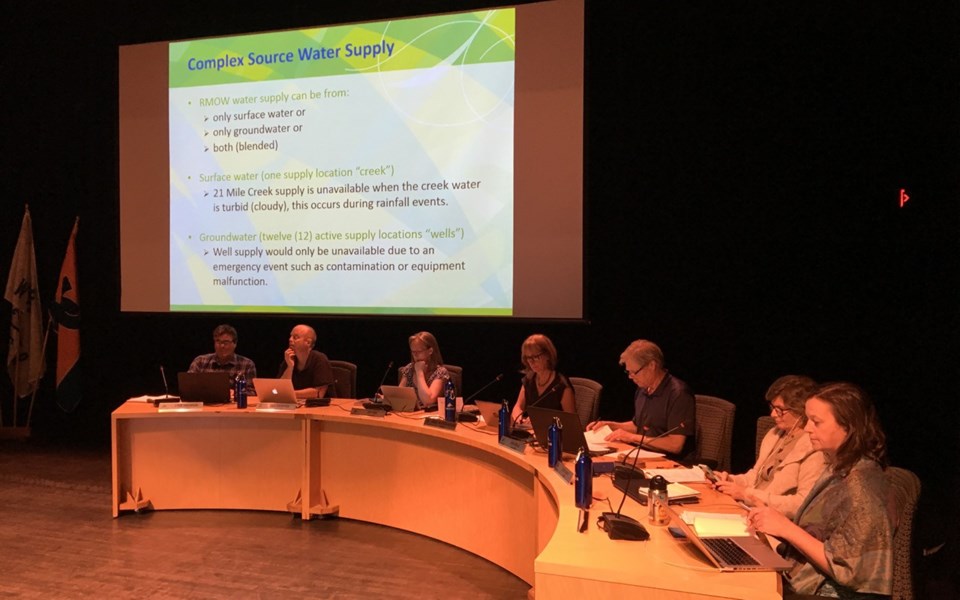New proposed guidelines for drinking water could have costly implications for communities along the coast.
The interim guidelines—now under consultation with the federal government—aim to reduce exposure to lead and copper in drinking water.
One proposed change involves shifting the operational guidelines for pH—one of 15 factors that contribute to corrosivity of drinking water—from a range of 6.5-8.5 to 7-10.5 (on a scale from one to 14).
A pH of 7 is considered neutral. A low pH is a major factor in the corrosivity of water.
Corrosive water can leach metals like lead and copper from plumbing fixtures, as was the case in the Village of Pemberton (VOP) in 2016.
Research has shown that there is no safe chronic exposure levels to lead, and that blood-lead concentrations—even at low levels—are linked to lower IQ scores in kids aged three to five, and the associated declines in IQ are in fact greater at lower blood-lead concentrations.
"My approach to Whistler and other communities is that they should maintain their water quality within the pH guideline of 7 to 10.5 ... if the water supply system has a pH of less than 7, we're asking them to look into the prospects of improving the pH by supplementation with additives," said Len Clarkson, drinking water officer with Vancouver Coastal Health (VCH).
For Whistler, the situation is complicated. The local water supply is complex, coming from both surface and groundwater sources—the main source being 21 Mile Creek, which has a pH that is approximately neutral.
But it's the groundwater sources—typically ranging from 6.3 to 7 on the pH scale—that could prove costly.
The Resort Municipality of Whistler (RMOW) is commissioning a Request for Proposals for water treatment systems at eight groundwater locations.
The total potential cost is unknown at this point, but for context one only need look to the north: The VOP installed a soda ash conditioning system to treat its water and raise the pH at a total cost of $862,079.
"When 21 Mile Creek is flowing, which is usually about half of the year, there are no pH issues, so we're quite concerned about the prospect of adding chemicals to a groundwater supply to increase pH, because many factors cause corrosivity, not just low pH," said Mayor Nancy Wilhelm-Morden.
"So to add chemicals, as well, is trying to address a problem that only occurs some of the time and impacts only some of the residents."
Further, VCH has been reviewing the interim guidelines, and is unsure if the costly treatments will be a comprehensive fix-all, said RMOW utilities group manager Gillian Woodward in a presentation to council.
"So in addition to water conditioning, if that was going forward, it might not completely mitigate the need for plumbing upgrades, continuing to flush taps, and/or installing and maintaining filters," Woodward said.
The main message for homeowners on the coast is to flush their taps—or let the water run until it's cold—before drinking it.
The RMOW tests its water at 24 locations in the distribution system every second week, and says it meets or exceeds all federal and provincial drinking water standards. Under the Drinking Water Protection Act, municipalities are required to deliver water within those standards to the property lines of homeowners.
"The municipality's obligation for potable water ends at the property line, so if homeowners want to do their own testing at the tap, that's up to them, and if they detect an issue, again, it will be up to them to correct it," Wilhelm-Morden said.
"We know what the water looks like up to the property line. What happens thereafter depends on things like the pipes the property owners have used, the maintenance that has gone on, (and) the water stagnation time is another factor."
However, the new guidelines also propose that sampling be done at the taps of private homes—something neither VCH nor the RMOW are onboard with.
"It's hard to effectively put the onus on the municipality to be responsible for peoples' internal plumbing, so that's where it starts to involve a bit more thought in terms of what the homeowner or business owner can do about their own mitigation processes," Clarkson said.
Testing at the taps of private homes is not a common practice anywhere in Canada except for Ontario, where it is mandated that the water supplier tests in homes as well as in public buildings and distribution systems.
When Pemberton's corrosivity issues came to light, the VOP conducted home testing to gather data as part of its forward planning process. Elevated levels of lead were found at the taps of some private homes, prompting the VOP to move forward with the soda ash conditioning system.
In the end, the guidelines are not legislation—the only parameters that are regulated in B.C. are coliform bacteria, total coliform and E.coli bacteria, Clarkson said.
Instead, VCH uses the guidelines to interpret what acceptable levels are for the various parameters.
"So if you fail one of them, you're not failing a regulation, you're not failing a law, you're just failing a guidelines value," Clarkson said. "But nobody really is willing to depart from them."
It's hard to say how widespread the issue of corrosion is in Whistler. In 2016, University of British Columbia Civil Engineering professor Loretta Li began a study looking into corrosion in the water system, but the RMOW said the study was cut short last year after a federal grant fell through.
Whistler residents can find more drinking water resources—including tips to protect themselves from lead exposure—at www.vch.ca/public-health/environmental-health-inspections/drinking-water.
On Friday, May 11, as part of Drinking Water Week, the RMOW is screening the James Bond movie Quantum of Solace at 6 p.m. at the Rainbow Theatre. Staff will be on hand to answer questions about water quality and conservation. Tickets are available at the door by donation to AWARE.
Find more info at whistler.ca/drinkingwater.




